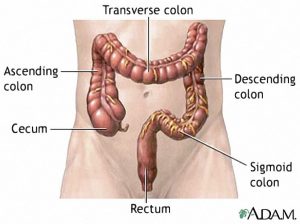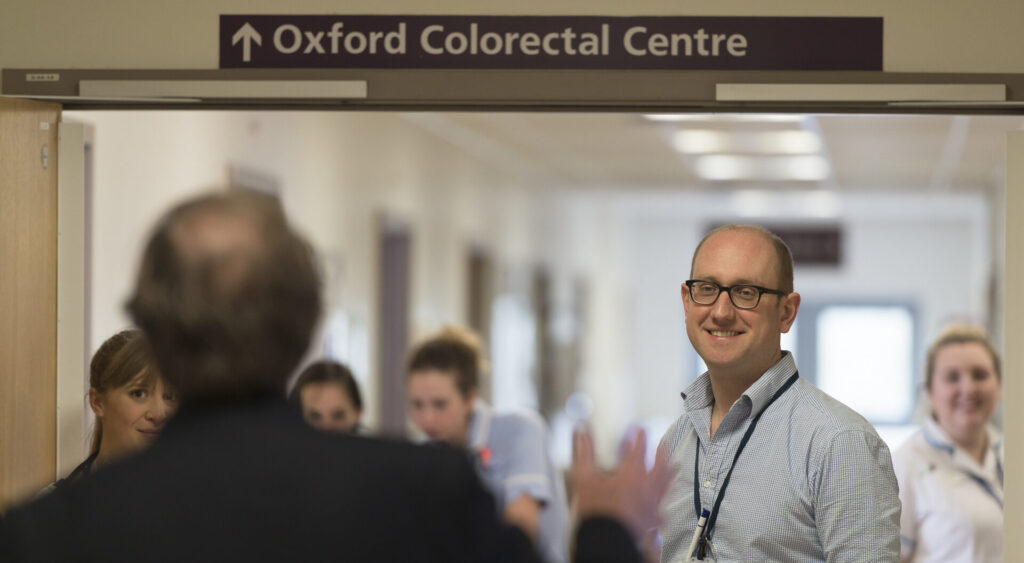Occtopus – Oxford Colon Cancer Trust
Founded in 2003 by consultants and former patients of Oxford University Hospitals, Occtopus, or the Oxford Colon Cancer Trust charity, is a leading Inflammatory Bowel Disease and Colorectal Cancer charity. The charity pioneers new treatments for colorectal cancer, colitis and Crohn’s and influences how they are treated across the NHS and funds breakthrough national and international research to improve patient outcomes and care.
Donations to the charity helps to fund research and innovation at the Oxford Colorectal Surgery department which has an international reputation and is leading the way in the management of colorectal diseases. It also funds UK wide research and training in IBD and colorectal cancer and the team have pioneered laparoscopic, keyhole and robotic surgery.
The charity is chaired by Professor Sir Neil Mortensen who is a Professor of Colorectal Surgery, Nuffield Department of Surgery, University of Oxford.
There is evidence that the incidence of colorectal (bowel) cancer is increasing in Europe. According to the World Cancer Research Fund, data on cancer cases in the UK shows:
- – There are around 49,914 new bowel cancer cases in the UK every year, that’s nearly 137 every day (2021)
- – Bowel cancer is the 3rd most common cancer in the UK (2021)
Anything to do with the bowel is a ‘Cinderella’ subject. It does not have the immediate appeal that heart or children’s disease has for example and donations to cancer charities fell by £64million last year. Which is why the generosity of our supporters is so critical.
| Cancer Giving and Spend (2021) | £ |
|---|---|
| Breast cancer | 51.5 million |
| Prostate cancer | 24.6 million |
| Lung cancer | 37.6 million |
| Colorectal (bowel) cancer | 39.5 million |
Source: National Cancer Research Institute
Such is the speed of progress in colorectal surgery that new techniques and high technology equipment are being introduced all the time. Incisions and access to body cavities are becoming smaller and smaller in what is called minimally invasive or key-hole surgery. Occtopus aims to help the colorectal team at the Oxford University Hospitals keep up to date with, and even ahead of these advances. Our patients benefit from the very latest treatment and we educate the surgeons of the future in the most modern procedures.
Occtopus has already raised over £1,250,000 and funded two special key-hole theatres, one at the John Radcliffe and the other more recently at the surgery and diagnostics centre at the Churchill Hospital. In 2019 we helped establish a permanent Chair for Colorectal Surgery within the University of Oxford working at Oxford University Hospitals.
Learn more about the projects we fund.
We seek to fund, and co-fund, with partner organisations, activities which are at the forefront of treatment and cure of the conditions we cover. This may include a pioneering type of procedure which has not become generally accepted or adopted by the NHS as standard:
- the purchase of equipment that is required;
- the research and analysis of such procedures to provide an evidential base for their benefits and widespread adoption;
- provision of training to practitioners worldwide in the undertaking of the procedure
We also consider ad hoc requests for funding of early-stage research ideas and other projects.
Report & Accounts 2022
The Trust has posted the latest accounts for the year ended 2022 a copy of which can be accessed here.
Members of the governing committee can be found here. If you require further information please contact us.
Charity Number 1104702.
The 3 C’s we support
Colorectal Cancer
 Sometimes called bowel cancer this is a very common problem and early cases can be cured with surgery alone. Symptoms include bleeding from the bowel, a change in bowel habit, a lump in the abdomen, and sometimes pain. Patients finding these symptoms will be investigated by colonoscopy or CT colon exam. With the introduction of a national screening programme for bowel cancer there has been a shift from 10% of cases being classed as early to over 40% and this is an opportunity for keyhole or minimally invasive surgery.
Sometimes called bowel cancer this is a very common problem and early cases can be cured with surgery alone. Symptoms include bleeding from the bowel, a change in bowel habit, a lump in the abdomen, and sometimes pain. Patients finding these symptoms will be investigated by colonoscopy or CT colon exam. With the introduction of a national screening programme for bowel cancer there has been a shift from 10% of cases being classed as early to over 40% and this is an opportunity for keyhole or minimally invasive surgery.
The anatomy of the colon is shown on the right, and during surgery, a section of the colon is removed and usually rejoined. After the pathologist has examined the removed colon and especially any lymph glands a decision is made about postoperative chemotherapy.
For more information see the Cancer Research UK website www.canceresearchuk.org
Colitis and Crohn’s disease
These two diseases are often clumped together as IBD or inflammatory bowel disease.
They cause ulceration and narrowing of the bowel. If surgery is needed major procedures are required which are especially suitable for keyhole applications since the patients are young and want to avoid long incisions and return to normal activity as soon as possible.
Continence
The colon and rectum and indeed the rest of the intestinal tract cannot function well unless the pelvic floor works properly. Delicate mechanisms control continence, and although these are often not consciously appreciated when they go wrong there can be a huge effect on quality of life.

